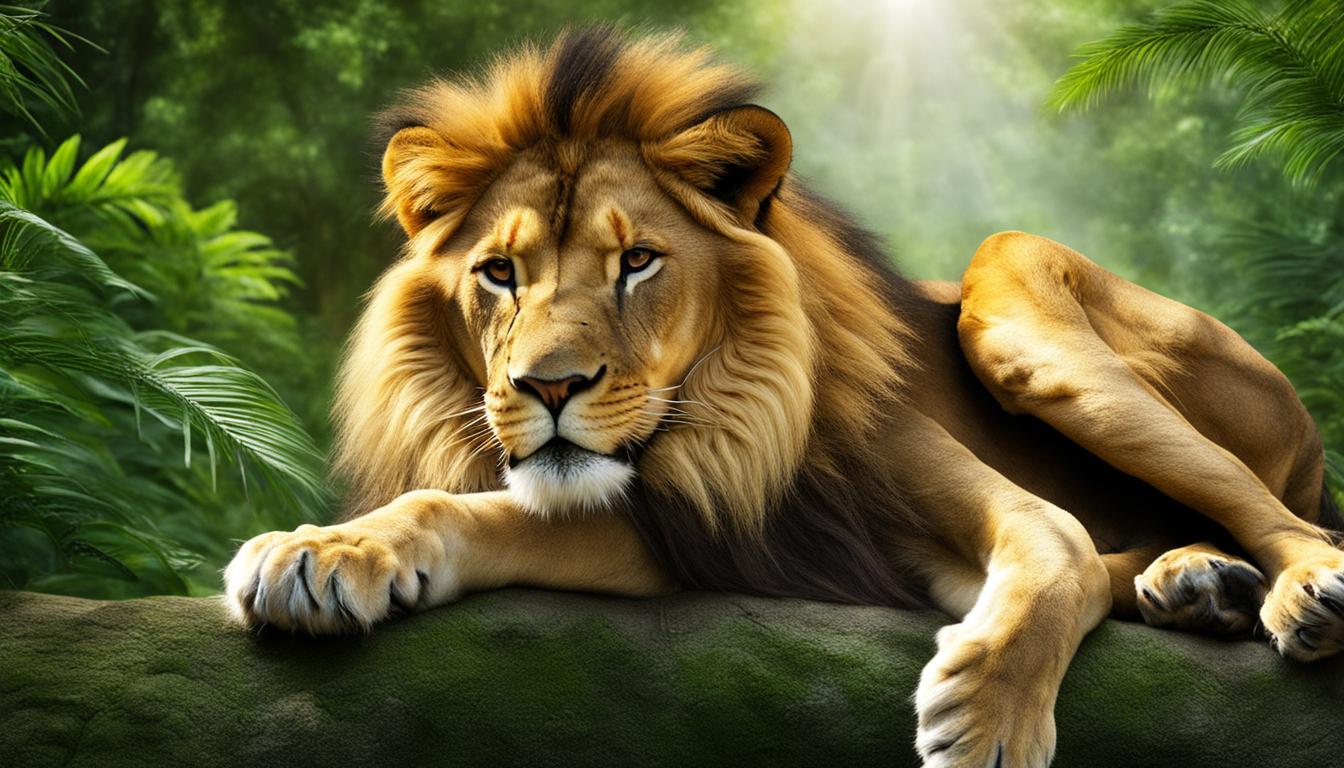Welcome to our exploration of lion sleep habits! Have you ever wondered how much lions sleep or why they spend so much time resting? In this article, we’ll delve into the fascinating world of lion sleep, discussing their sleep duration, patterns, and the importance of sleep for these majestic creatures. So, let’s dive in and learn more about lion sleeping habits!
Key Takeaways:
- Lions sleep for an average of 18-20 hours per day for males and 15-18 hours per day for females.
- Extended sleep duration is crucial for lions’ survival and energy conservation.
- Lions are crepuscular animals, most active during twilight hours.
- Sleeping allows lions to conserve energy for hunting and aids in digestion.
- Lions have distinct sleep positions, sleep in groups, and exhibit various sleep behaviors.
Lion Sleep Patterns and Behavior
Lions, with their majestic presence and fascinating behaviors, also exhibit distinctive sleep patterns and behaviors. The way they sleep and rest provides insights into their survival strategies and unique adaptations.
When it comes to sleeping positions, lions are known for their adorable habit of sleeping with all four paws straight up in the air. This position not only looks cute but also serves a purpose. By exposing their bellies and limbs to the air, lions can cool off and regulate their body temperature more effectively, especially during hot African days.
“Lions have adopted this position to beat the heat and chill while conserving energy,” says Dr. Jane Wilson, a leading expert in animal sleep behavior.
In addition to their sleeping positions, lions are also social sleepers. They often sleep in groups known as prides, which provides them with security and allows them to take turns keeping watch for potential threats. This social sleeping behavior ensures that there is always a sentinel on guard, enhancing the safety and survival of the pride as a whole.
| Lion Sleep Patterns and Behavior | Key Features |
|---|---|
| Sleeping Positions | Four paws straight up in the air for temperature regulation |
| Social Sleeping | Sleeping in prides provides security and enables rotating sentinels |
| Restlessness and Napping | Frequent napping and occasional movements during sleep |
During their sleep, lions also display restlessness and occasional movements. This restlessness may be due to the need to readjust their sleeping positions or the result of chasing prey in their dreams. It’s not uncommon to see a lion twitching or even letting out a muffled roar while asleep, as if they are reliving their victorious hunts in the savannah.
Understanding lion sleep patterns and behavior provides us with a glimpse into the fascinating world of these magnificent creatures. From their unique sleeping positions to their social sleeping habits, lions continue to captivate us with their remarkable adaptations.
The Importance of Sleep for Lions
Research has shown that sleep plays a vital role in the overall well-being and survival of lions. It is not just a period of rest, but a complex physiological and cognitive process that contributes to their physical health and hunting abilities. Sleep in lions consists of different stages, including rapid eye movement (REM) sleep and non-REM sleep, each serving a specific purpose.
Lion Sleep Stages
During REM sleep, lions experience heightened brain activity and vivid dreams. This stage is crucial for memory consolidation and learning, allowing lions to retain important information about their environment, prey, and hunting strategies. Non-REM sleep, on the other hand, focuses on physical restoration, including tissue repair, hormone regulation, and immune system functioning.
Just like in humans, a lack of sleep can have detrimental effects on a lion’s health and overall performance. Sleep deprivation can lead to decreased cognitive function, impaired decision-making skills, decreased immune response, and increased susceptibility to diseases. It can also hamper a lion’s ability to effectively hunt and survive in the wild.
| Sleep Stage | Function |
|---|---|
| REM Sleep | Memory consolidation, learning |
| Non-REM Sleep | Tissue repair, hormone regulation, immune system functioning |
Therefore, sleep is not just a luxury for lions, but a biological necessity. It allows them to conserve energy, recover from physical exertion, and be fully alert and prepared for hunting. The sleep patterns and behaviors of lions have evolved to meet their specific needs in the wild, and understanding these patterns can provide valuable insights into the importance of sleep in both the animal kingdom and human life.
Comparisons with Other African Wildlife
When it comes to sleep duration, lions stand out among other African wildlife. While lions sleep for an average of 18-20 hours per day for males and 15-18 hours for females, other animals have significantly different sleep patterns. Take giraffes, for example. These tall creatures sleep for only about 30 minutes a day, as prolonged sleep makes them vulnerable to predators. Impalas, known for their agility, also sleep for short periods to remain alert and vigilant. Even elephants, despite their large size, have shorter and interrupted sleep periods compared to lions.
To better understand the differences, let’s take a look at the table below:
| Animal | Sleep Duration |
|---|---|
| Lion | 18-20 hours (males) 15-18 hours (females) |
| Giraffe | 30 minutes |
| Impala | Short periods |
| Elephant | Short and interrupted sleep periods |
As you can see, lions clearly outshine other African wildlife in terms of sleep duration. These differences in sleep patterns have evolved based on the specific survival needs of each species. Lions, with their extended sleep periods, are able to conserve energy for hunting during optimal times, while other animals adapt their sleep requirements to stay alert and avoid becoming prey. Understanding these variations gives us a deeper appreciation for the fascinating world of animal sleep habits.
Sleep Habits of Other African Big Cats
While lions may be the kings of the jungle, they are not the only big cats in Africa with fascinating sleep habits. Leopards, known for their elusive nature, share similar sleeping patterns with lions. These nocturnal creatures spend a significant part of their day resting or sleeping. However, leopards have a unique preference for sleeping in trees, offering them safety and protection from potential predators.
Cheetahs, on the other hand, have a sleep duration that differs from both lions and leopards. Although they also require restful periods, cheetahs have relatively shorter sleep durations. This adaptation aligns with their incredible speed and agility, as they need to conserve energy for their bursts of lightning-fast movement during hunting.
Both leopards and cheetahs, like lions, have evolved specific sleep habits that suit their hunting and survival strategies. Understanding the sleep patterns of these African big cats provides valuable insights into the diverse sleep behaviors found in the animal kingdom.
Sleep Habits of African Big Cats
| Cat Species | Sleep Duration | Sleeping Preferences |
|---|---|---|
| Lions | Long durations | Sleeping in shaded areas, such as bushes or trees |
| Leopards | Restful periods | Sleeping in trees for safety and avoiding predators |
| Cheetahs | Relatively shorter durations | Conserve energy for bursts of speed during hunting |
The diverse sleep habits and adaptations of African big cats are a testament to the remarkable ways different species have evolved to survive and thrive in their respective environments.
Sleep in the Animal Kingdom
When it comes to sleep, humans aren’t the only creatures that need their rest. The animal kingdom is filled with a diverse range of sleep patterns and behaviors. From dolphins and seals sleeping with half their brain to hibernating bears surviving harsh winters, sleep plays a crucial role in the lives of many different species.
Sleeping Habits of Aquatic Animals
Aquatic animals have developed unique sleep adaptations to survive in their watery environments. Dolphins and seals, for example, exhibit unihemispheric sleep, where only one hemisphere of their brain sleeps at a time. This allows them to remain alert to potential dangers while still getting the rest they need. Additionally, these animals have mastered the art of “bobbing sleep,” where they can float and sleep without fully submerging.
Sleeping Strategies of Hibernating Animals
For hibernating animals like bears and groundhogs, sleep is a critical part of their survival during the winter months. These animals experience long periods of dormancy, slowing down their metabolic rate and conserving energy. During hibernation, their body temperature drops, and their breathing and heart rate decrease significantly. This adaptation allows them to withstand the cold and scarcity of food while waiting for spring to arrive.
| Animal | Sleep Adaptation |
|---|---|
| Dolphins | Unihemispheric Sleep |
| Seals | Unihemispheric Sleep |
| Bears | Hibernation |
| Groundhogs | Hibernation |
These examples highlight just a few of the many fascinating sleep adaptations found in the animal kingdom. Whether it’s conserving energy, remaining vigilant, or surviving extreme conditions, sleep serves a crucial purpose for animals of all kinds. So next time you catch your pet cat snoozing, remember that they’re just following their natural instincts and getting the rest they need.
The Importance of Sleep for Humans
Sleep is a fundamental aspect of human health and well-being. Adequate sleep is essential for our overall physical and mental functioning. It is during sleep that our bodies rejuvenate and repair themselves, allowing us to wake up refreshed and ready to face the day ahead. However, in today’s fast-paced world, many people often overlook the importance of getting enough sleep.
Sleep deprivation can have a detrimental effect on our cognitive abilities and overall productivity. When we don’t get enough sleep, our attention span, memory, and decision-making skills are compromised. This can lead to decreased performance at work or school and even increase the risk of accidents and errors.
Not only does sleep affect our cognitive function, but it also plays a crucial role in maintaining our physical health. Chronic sleep deprivation has been linked to an increased risk of developing chronic conditions such as obesity, diabetes, and cardiovascular disease. Lack of sleep can also weaken our immune system, making us more susceptible to illnesses and infections.
In the words of sleep expert Matthew Walker, “The shorter your sleep, the shorter your life.”
To ensure that you prioritize your sleep and reap the benefits of a good night’s rest, it is recommended that adults aim for 7-9 hours of sleep each night. Establishing a consistent sleep schedule, creating a relaxing bedtime routine, and optimizing your sleep environment can all contribute to better sleep quality.
Conclusion
Lions truly are remarkable creatures with their unique sleep patterns and behaviors. Observing how lions sleep can provide valuable insights into the importance of sleep, not just for animals, but for humans as well. The prolonged sleep duration of lions allows them to conserve energy, recover from physical exertion, and be fully alert for hunting. So, next time you find yourself in need of a good night’s sleep, take a cue from the king of the jungle and sleep like a lion.
Sleep is a fundamental aspect of life, and it plays a crucial role in overall health and well-being. Whether in lions or humans, adequate sleep is essential for maintaining cognitive function, supporting physical health, and promoting emotional well-being. By prioritizing quality sleep, you can recharge your brain, repair your body, and consolidate memories for optimal daily functioning.
It’s important to recognize that sleep patterns and behaviors vary throughout the animal kingdom, as different species have evolved to adapt to their specific survival strategies. From dolphins sleeping with half their brain to bears hibernating during winters, sleep is shaped by evolutionary adaptations and environmental factors. Understanding sleep in animals can deepen our appreciation for this vital aspect of life.
So, remember to prioritize your sleep, just like the mighty lion. Embrace the power of quality rest and allow your body and mind to rejuvenate. Sleep like a lion and seize each day with renewed energy and vitality.
Do tigers and lions hunt the same prey animals in the wild?
Tigers and lions have slightly different preferences when it comes to hunting. While lions primarily target large herbivores such as zebras, wildebeests, and buffalos, the main prey animals of tigers consist of deer, wild boar, and various types of antelope. These distinct choices in prey reflect their unique hunting styles and natural habitats.
FAQ
How many hours a day do lions sleep or rest?
Lions typically sleep or rest for an average of 18-20 hours per day for males and 15-18 hours per day for females.
Why do lions sleep so much?
Lions sleep for extended periods to conserve energy for hunting during the cooler, darker hours when their prey is less active. Sleeping also helps them digest the large amounts of protein they consume and stores energy for hunting.
What are some of the sleep patterns and behaviors of lions?
Lions often sleep with four paws straight up in the air, which helps them cool off and regulate body temperature. They also sleep in shaded areas to escape the African heat and sleep in groups called prides for security.
How does sleep benefit lions?
Sleep plays a vital role in the overall well-being and survival of lions. It helps with memory consolidation, hormone regulation, and immune system functioning. Lack of sleep can have detrimental effects on their health and hunting abilities.
How do lion sleep patterns compare to those of other African wildlife?
Lions sleep for much longer periods compared to other African wildlife. Giraffes, for example, sleep for only about 30 minutes a day, while impalas sleep for short periods to remain alert. Elephants have shorter, interrupted sleep periods.
Do other African big cats have similar sleep patterns to lions?
Yes, other African big cats like leopards and cheetahs also have similar sleep patterns. Leopards are nocturnal animals and spend much of their day resting or sleeping, often in trees for safety. Cheetahs sleep for shorter durations compared to lions.
How does sleep differ among animals in the animal kingdom?
Different animals have different sleep patterns and durations based on their evolutionary adaptations and survival needs. Some animals, like dolphins and seals, can sleep with only half of their brain at a time, while hibernating animals experience long periods of dormancy.
Why is sleep important for humans?
Sleep is essential for human health and well-being. It helps with cognitive function, immune system function, and overall physical and mental health. Adequate sleep allows the brain and body to recharge, repair, and consolidate memories.











